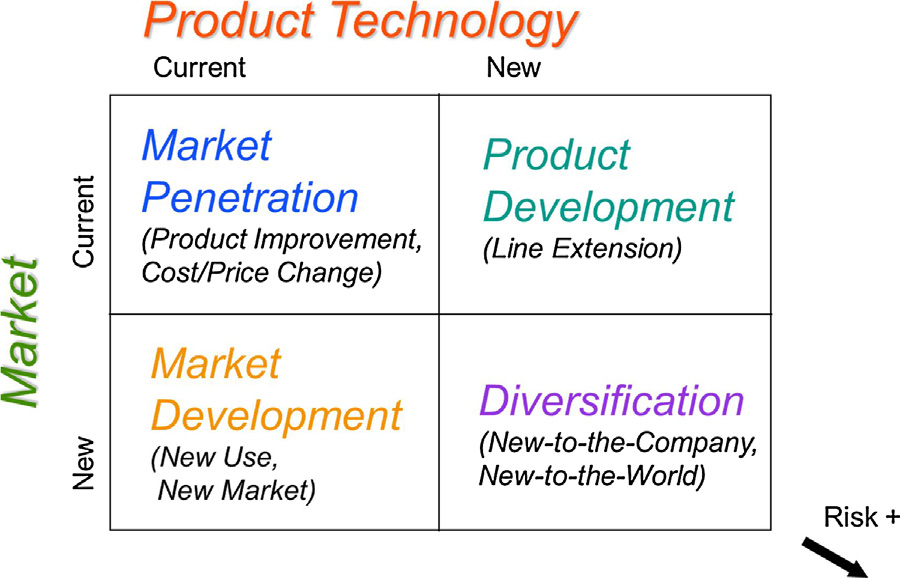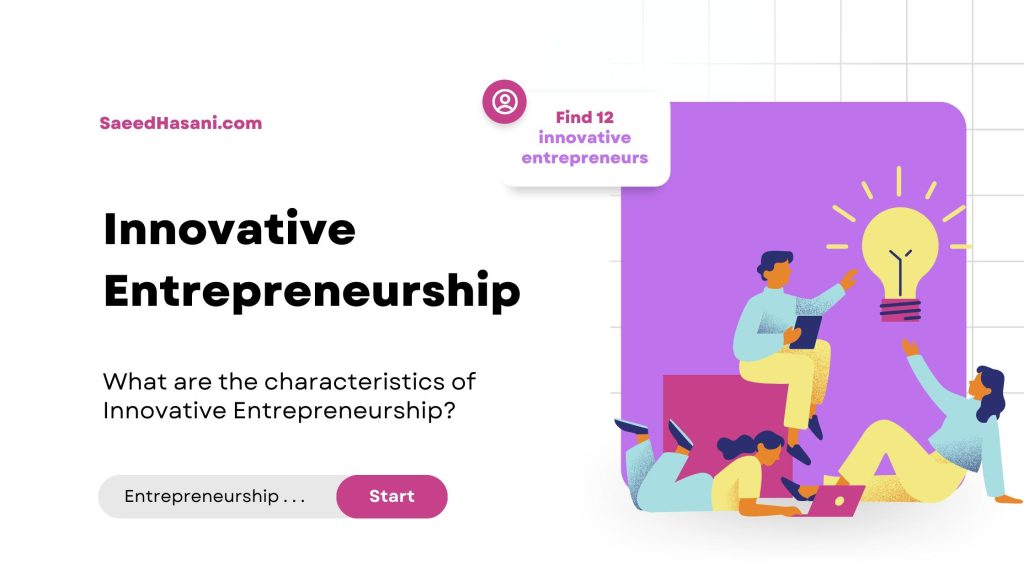Exploring the Concept of Innovation: A Comprehensive Guide

In today’s rapidly evolving business landscape, the heartbeat of success is innovation. It’s that spark of brilliance that transforms the mundane into the extraordinary.
As we navigate this dynamic world, it’s essential to grasp the multifaceted nature of innovation, its pivotal role in propelling businesses forward, and the exciting possibilities it unlocks.
In this blog post, we’ll embark on a journey through the realm of innovation, exploring its many facets, its enduring importance, and how you can harness its power to shape a brighter future for your endeavors. So, fasten your seatbelts; innovation awaits!
Understanding Innovation
Hey there, fellow entrepreneurs! Here, let’s dive into the exciting world of innovation. We’ll break it down in a casual, easy-to-digest way, so whether you’re a seasoned business pro or just starting out, you’ll find some nuggets of wisdom here.
Defining Innovation: A Comprehensive Exploration
- Simple Definitions of Innovation: Okay, so what the heck is innovation, right? Well, at its core, innovation is all about doing something new or doing something old in a new, better way. It’s that spark that ignites progress.
- Innovation Meaning in English: No need for fancy jargon here. In plain English, innovation is just being creative and coming up with fresh ideas that make life or business better. It’s like the lightbulb moment when you realize there’s a better way to do things.
- The Concept of Innovation: Think of innovation as the driving force behind progress. It’s not just about gadgets and gizmos; it’s about making improvements in any aspect of life, from the way you make your morning coffee to the way you run your business.
The Evolution of the Term “Innovation”
- Historical Context: Did you know that people have been innovating for centuries? From the wheel to the internet, humans have been on a non-stop journey of creating and improving. The term “innovation” has been around for a while, but its significance has grown as we’ve become more reliant on technology and change.
- Innovation in Different Fields: Innovation isn’t limited to one industry or area. It’s like a chameleon; it can adapt and thrive in various fields. Whether you’re in tech, healthcare, or even the food industry, innovation is your trusty sidekick.
The Multifaceted Nature of Innovation
- Technological Innovation: This one’s a crowd-pleaser. Think of the latest smartphone or those self-driving cars we’ve all heard about. Technological innovation is all about creating new gadgets and making the ones we have even cooler.
- Process Innovation: Ever streamlined a business process to make it more efficient? That’s process innovation. It’s like taking your clunky, old-school fax machine and replacing it with email – a game-changer.
- Product Innovation: Remember the first iPhone? Game-changer, right? Product innovation is all about making something new or upgrading an existing product to make it irresistible to customers.
- Business Model Innovation: This one’s for the strategists out there. Business model innovation is about rethinking how you do business. It’s like Uber turning the taxi industry upside down by offering a completely different way to get around.

Innovation isn’t just one thing – it’s a dynamic, ever-evolving concept that can take many forms. It’s about thinking differently, staying curious, and, most importantly, making things better, whether you’re crafting the next big app or perfecting your mom’s secret spaghetti sauce recipe.
Innovation in Business
Here, we’re diving headfirst into the exciting world of innovation in business. Buckle up, because this stuff is the secret sauce to success!
The Significance of Innovation for Business
- Staying Competitive in the Market: Picture your business as a speedy cheetah. Innovation is the turbo boost that keeps you ahead of the pack. In the cutthroat world of business, if you’re not innovating, you’re falling behind. You want to be the one setting trends, not chasing them.
- Meeting Evolving Customer Needs: Customers are like the cool kids in high school – their tastes change constantly. To keep them swooning over your products or services, you’ve got to adapt and innovate. Listen to what they want, and then deliver it in style.
- Achieving Sustainable Growth: Innovation isn’t just a one-time thing. It’s the fuel that keeps your business engine running smoothly. Sustainable growth means keeping the cash flowing, expanding your horizons, and creating a legacy. And guess what? Innovation is your trusty compass on this journey.
Defining Innovation in a Business Context
- Innovation in Business Definition: Alright, let’s cut through the fancy lingo. In the world of business, innovation means coming up with fresh ideas, processes, or products that give you an edge. It’s like jazzing up your menu at a restaurant with a new dish that’s an instant hit.
- Business Definition of Innovation: Here, innovation isn’t just about having cool gadgets or a fancy R&D lab. It’s about being a problem solver. It’s about finding better ways to run your ship, whether you’re a solo entrepreneur or the captain of a massive corporation.
Types of Innovation in Business
- Incremental Innovation: This is like making small upgrades to your product or service. Think of it as leveling up gradually. It’s those regular software updates on your phone that make it run smoother or add a new flavor to your ice cream lineup. Incremental innovation keeps you fresh without reinventing the wheel.
- Disruptive Innovation: Ever heard of a little thing called Uber? Disruptive innovation is like a tornado hitting the market – it shakes things up big time. It’s about introducing something so radically different that it changes the game. Like when Netflix took on Blockbuster with online streaming.
- Open Innovation: Here’s the cool part – you don’t have to do it all on your own. Open innovation is about collaborating with others, sharing ideas, and tapping into external brainpower. It’s like having a team of superheroes to help you tackle your business challenges.

So, dear entrepreneurs, remember this: Innovation is your superpower. It’s not just about having the fanciest gadgets or the trendiest marketing. It’s about being adaptable, solving problems, and thinking outside the box.
Innovative Ideas: Meaning and Significance
Let’s dive into the exciting world of innovative ideas. We’re going to break it down in a super casual way so you can grab those nuggets of wisdom without breaking a sweat.
What are Innovative Ideas?
- Innovative Ideas Definition: Alright, let’s start with the basics. Innovative ideas are like those lightbulb moments when you think, “Hey, why hasn’t anyone done this before?” It’s about coming up with fresh, creative, and out-of-the-box solutions to everyday problems.
- Simple Definition of Innovation: Think of innovation as the cool cousin of creativity. It’s taking those creative ideas and turning them into something that changes the game, whether it’s a new product, a smarter process, or a more effective way to run your business.
Fostering a Culture of Innovation
- Encouraging Employees to Generate Innovative Ideas: Your employees are a goldmine of ideas waiting to be tapped. Encourage them to speak up, share their thoughts, and don’t be afraid to try new things. Remember, even the most groundbreaking ideas often start as wild thoughts.
- Creating an Innovation-Friendly Environment: Imagine your workplace as a playground for innovators. Provide a space where people feel free to brainstorm, experiment, and maybe even make a mess (in a productive way, of course). Sometimes, a relaxed, fun environment is where the best ideas are born.
The Role of Innovative Ideas in Business Success
- Examples of Innovative Companies: Ever heard of a little company called Apple? They took a regular old phone and turned it into an iPhone, a game-changer. Or how about Tesla, making electric cars cool? These are the poster children for innovative companies. They didn’t just follow the trends; they set them.
Innovative ideas aren’t just a fancy buzzword. They’re the rocket fuel for your business. They can take you from ‘ho-hum’ to ‘wow’ in no time. It’s about thinking differently, encouraging creativity, and being open to change.
Innovation’s Impact on Industries
Here, we’re going to explore the wild and wonderful world of innovation and how it’s shaking things up across various industries. Grab your coffee and let’s dive in!
Examining Innovation Across Various Sectors
- Technology and IT: Buckle up because this is where the cool kids hang out. In the tech world, innovation is like the air they breathe. Companies like Apple, Google, and Amazon keep pushing boundaries, making gadgets smarter, software slicker, and the internet a second home.
- Healthcare and Biotechnology: Innovation in healthcare is literally a lifesaver. Think about groundbreaking treatments, telemedicine, and wearable health tech. Innovators in this field are like modern-day superheroes, battling diseases and extending our lifespans.
- Manufacturing and Production: Don’t think factories are boring! Innovation here means faster, smarter, and eco-friendlier production. 3D printing, automation, and lean manufacturing are revolutionizing how things are made, making it a win for businesses and the environment.
- Finance and Banking: Even the banking world is getting a makeover. Fintech companies are changing the game with mobile banking, digital wallets, and cryptocurrencies. It’s all about making our financial lives easier and more accessible.
Case Studies of Innovative Companies in Different Industries
- Tesla (Automotive): Ever heard of a car that drives itself? Tesla’s electric vehicles aren’t just eco-friendly; they’re at the forefront of autonomous driving technology. Elon Musk is a master of thinking big and shaking up an entire industry.
- Netflix (Entertainment): Remember Blockbuster? Netflix disrupted the entertainment world by introducing streaming services. They turned the way we watch TV upside down, and now binge-watching is practically a sport!
- Amazon (Retail): Jeff Bezos took an online bookstore and transformed it into a retail giant that delivers everything to your doorstep. Amazon’s innovations in logistics, drone delivery, and AI-driven recommendations are legendary.
- SpaceX (Space Exploration): Elon Musk makes another appearance with SpaceX. They’re not just aiming for the stars; they’re reaching them. SpaceX is redefining space travel and making Mars a possible vacation destination.
The message is clear: Innovation isn’t just a buzzword; it’s the lifeblood of progress in every industry. Whether you’re coding in Silicon Valley or designing the next medical breakthrough, innovation is what keeps us moving forward.
Measuring and Managing Innovation
Here, we’re going to roll up our sleeves and get into the nitty-gritty of measuring and managing innovation. Don’t worry; we’ll keep it actionable. Let’s jump in!
Key Performance Indicators (KPIs) for Innovation
Metrics to Track Innovation Success: So, you’ve got this brilliant innovation brewing, but how do you know if it’s a hit or miss? That’s where KPIs come in. You want to keep an eye on things like revenue from new products, customer feedback, and the speed of your innovation pipeline. These numbers tell you if you’re on the right track or need to pivot.
Innovation Management Frameworks
- Stage-Gate Model: Imagine your innovation journey as a series of gates. At each gate, you evaluate your idea’s viability and decide whether to move forward or not. It’s like a reality show for your ideas, where only the best ones get to the next round.
- Lean Startup Methodology: This one’s for the risk-takers. The Lean Startup approach is all about building a ‘minimum viable product’ (MVP) quickly, testing it in the real world, and learning from user feedback. It’s like dipping your toe in the water before taking a full-on dive.
- Design Thinking Approach: Think of design thinking as putting your customer’s shoes on. You start by deeply understanding their problems and needs, then brainstorming, prototyping, and testing solutions. It’s a human-centric approach to innovation that keeps you customer-focused.
Overcoming Challenges in Managing Innovation
Innovation isn’t all sunshine and rainbows; it can be a rocky road. But fear not, here are some common hurdles and how to tackle them:
- Resistance to Change: People like their comfort zones. When you bring in new ideas, expect a bit of resistance. The solution? Communicate the ‘why’ behind the change, involve your team, and show them the benefits.
- Resource Constraints: Money and time are often tight. Prioritize your innovation efforts, allocate resources wisely, and consider partnerships or collaborations to stretch your budget.
- Fear of Failure: Innovation often comes with bumps in the road. Embrace failure as a stepping stone to success. Learn from your mistakes, pivot if needed, and keep that entrepreneurial spirit alive.
- Lack of a Clear Strategy: Innovation without a roadmap is like driving blindfolded. Define your innovation goals, align them with your business strategy, and create a roadmap to guide your journey.
Remember that innovation isn’t just about having cool ideas; it’s about managing them effectively. Use KPIs to track your progress, pick the right framework for your project, and don’t shy away from challenges. They’re just opportunities in disguise. Keep innovating, and who knows, the next big thing might be right around the corner!
The Future of Innovation
Let’s take a trip into the future and explore what’s in store for innovation.
Emerging Trends in Innovation
- Artificial Intelligence and Automation: Picture this: robots doing the heavy lifting, and AI making decisions. That’s where we’re headed. AI and automation are the cool kids on the innovation block, making processes faster, smarter, and, well, just plain awesome.
- Sustainability and Eco-Innovation: Green is the new black, my friends. Eco-innovation is all about creating products and services that don’t just look good on the shelves but also do good for the planet. Think electric cars, renewable energy, and biodegradable packaging.
- Digital Transformation: The world is going digital in a big way. Whether you’re in a traditional industry or a tech-savvy startup, digital transformation is about embracing tech like the cloud, IoT, and big data to stay competitive and relevant.
The Role of Innovation in Addressing Global Challenges
- Climate Change: It’s a hot topic (pun intended). Innovation is our best shot at tackling climate change. From cleaner energy solutions to carbon capture tech, we need ingenious ideas to save our planet. So, fellow entrepreneurs, there’s no planet B – let’s get to work!
- Healthcare: In the age of pandemics, healthcare innovation is crucial. Telemedicine, AI-driven diagnostics, and precision medicine are changing the way we stay healthy. It’s not just about treating diseases; it’s about preventing them.
- Economic Disparities: Innovation isn’t just for the elite. It can be a game-changer in bridging economic gaps. Entrepreneurship and social innovation can create jobs, empower communities, and reduce disparities in income and access to resources.
The future of innovation is looking bright. It’s about making our world smarter, greener, and more equitable. Whether you’re into AI, eco-friendly solutions, or reimagining traditional industries, there’s a world of opportunities out there.
Conclusion
Innovation is the beating heart of progress, and in this journey, we’ve explored its multifaceted nature, its transformative impact across diverse industries, and its exciting future trends. From AI to sustainability, innovation isn’t just a buzzword; it’s the compass guiding us toward a brighter tomorrow.
So, fellow entrepreneurs, let’s not just dip our toes in the waters of innovation but dive headfirst. Embrace it, nurture it, and watch your endeavors soar to new heights because innovation is the lifeline of both business and society, and it’s ours to shape.
Sources:







Responses